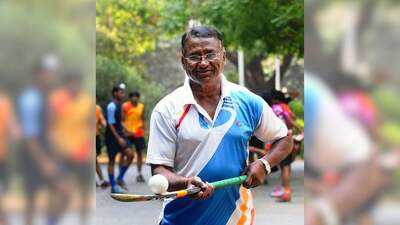The face of Major Dhyan Chand, the man they call the wizard of hockey, looms large at any promotion of Indian hockey’s centenary celebrations — set to kick off in Delhi on Friday. It must not have been an easy task to bear the mantle of being his son and also one of the most gifted players in the annals of Indian hockey, but Ashok Kumar wears the burden rather lightly.
Now 75, the decorated inside right of the 1970s is excited that his sport's rich 100-year legacy is set to be celebrated throughout the country. Growing up in a fabled hockey family, where Dhyan Chand’s younger brother Roop Singh was also an Olympic medallist, the maestro has a strong sense of humour and laughs heartily at the question of whether he was ever considered a product of nepotism.
‘’Well, these are terms coined in this generation. As far as I can remember, I took to hockey very young as it was a fun game played on the streets and in most cities, neither my father nor my uncle cared about me becoming a hockey player.
‘’The reason was simple: they were Army men who fell in love with hockey but it couldn’t provide you with a livelihood. However, the doors of selection kept opening up before me along with a golden generation of players,’’ said Ashok Kumar, a recipient of the Hockey India Major Dhyan Chand Lifetime Achievement Award last year.
While the high point of the crafty inside forward’s career was scoring the matchwinner in India's 2-1 win over Pakistan in a nerve-wracking 1975 World Cup final — the only time India won the trophy — he was much more than that.
He played stellar roles in India's podium finishes in the 1971 World Cup in Barcelona (bronze) and 1973 (silver, Amsterdam), along with three Asian Games silver medals (Bangkok 1970, Tehran 1974 and Bangkok 1978). Ashok Kumar was also a member of the bronze medallist Indian team at the 1972 Munich Olympics, notorious for the gunning down of Israeli athletes.
Reminiscing about his career with National Herald, Ashok Kumar felt complacency and faulty team selection were to be blamed for India missing out on both World Cups in ’71 and ’73. ‘’You see, favouritism has often been the curse of Indian sport. We missed three players in our campaign in ’71 badly –—if goalkeeper Cedric Periera, centre forward Balbir Singh and Enam-ur Rehman were there, we could have beaten any team,’’ he reflected.
A treasure trove of stories on the glorious journey of Indian hockey, Ashok Kumar dropped a surprise by saying that the magical craft of Dhyan Chand & Co. started winning admirers globally even before the 1928 Olympics in Amsterdam. At any event, India won three back-to-back Olympic golds in 1928, 1932 (Los Angeles) and 1936 (Berlin) — a tally which could have gone up by two more had the 1940 and 1944 Games not been cancelled due to World War II. However, India’s enviable Olympics haul includes 13 medals in all — eight gold, one silver and four bronze.
‘’There is a little-known story about how an Indian Army team, including my father, made the International Olympic Committee (IOC) change their minds about bringing hockey back after dropping it from the programme in 1924 due to a lack of spectators," he said.
Two years before the ’28 Games, he added, an Indian Army team sailed to New Zealand — remote and sparsely populated — "where my father and his team captivated the local spectators with their artistry in as many as 21 matches, during which they scored over 150-plus goals". Contemporary media reports said around 75,000 spectators in all watched the matches, and the magic of the 'Indian game' soon spread war and wide.
‘’The brains behind the trip was Pankaj Gupta, a visionary sports administrator from Kolkata, who held key positions in cricket, football and hockey. The impact of that tour paved the way for IOC to re-introduce field hockey in the Olympics and since then, there was no looking back for India,’’ Ashok Kumar said.
The visit to Amsterdam was an ordeal in itself, however. ‘’Our team comprised only military sepoys and a certain Subedar Jaipal Singh Munda was named the captain, not my father. Funds were scarce and I heard from my father that only an 11-member squad was sent. When their ship left Mumbai, only three people were there to see them off but when they came back as gold medallists, the Gateway of India was choc-a-bloc,’’ Ashok said.
While it’s a no-brainer that astro turf has changed the game over the last four decades, a downside of Asian hockey seems to be that the India-Pakistan rivalry is a thing of the past. Former world champions and multiple Olympic gold medallists, Pakistan even failed to qualify for the Paris Olympics and have clearly fallen on tough times.
‘’Yes, I have to agree. The difference between governance of hockey in both the countries is that once Pakistan stopped winning on a regular basis, the support from the government machinery slowed down a lot. We had no such issues, since the Sports Authority of India (SAI) supported them through thick and thin.
‘’Hence, we survived and the two bronze medals in a row in Tokyo and Paris have rekindled a lot of interest. However, there is still a long way to go before the youth can think of taking up hockey as a profession,’’ he signed off.
You may also like

Calcutta HC upholds order quashing transfer of junior doctor linked to RG Kar protest

Prince William arrives in Belem to deliver first-ever speech on behalf of King Charles

Bank Holiday Alert: One State to Observe Bank Closure on Friday, Find Out Why RBI Declared November 7 a Holiday

Himachal Pradesh holds National Stone Fruit Conference at Thanadhar

'I know who wins Celebrity Traitors and I'm honestly gutted'







